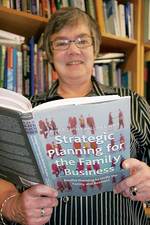Families get down to business
 Business Business
More than $1.6 trillion worth of assets in family-owned businesses will change hands in Australia over the next 10 years, yet 78% of them have not made any formal succession plans. It's a statistic that should concern all business owners, but planning the changeover from one generation to the next or preparing a business for sale remains a tricky problem, especially for family-owned enterprises. Dr Jill Thomas, a senior lecturer in the Adelaide Graduate School of Business, recently facilitated a session on Making Family Businesses Work at the Adelaide Convention Centre. Participants from two, third-generation family businesses contributed to lively debate. Held during Small Business Month in October, the session explored both the challenges and benefits of the family business. Family businesses comprise a significant part of the Australian economy, yet comparatively little research has been done to explain their complexities or verify their contribution. In Australia, it is estimated that almost 80,000 family businesses fail each year - a huge cost to the national economy. "There is a lot of emotion involved in a family business and the resulting complexities need to be taken into account by their advisers. It's not purely a matter of processing legal or monetary requirements when a business is sold, or passed over to the next generation. There is a whole range of related issues that need to be appreciated," Dr Thomas (pictured above) said. Family-owned businesses - which comprise 80% of the Australian business sector - do have the edge on their independent counterparts in some respects. Flexibility, timeliness of decision making and sidestepping bureaucracy are all advantages, Dr Thomas said, but if there is not some formalisation of structure and policies to deal with issues such as succession planning, family recruitment, and ownership responsibilities, then some messy disputes may result. "It is important to recognise that family businesses are not a homogenous sector. Some have multiple generations working in the business, as well as on the board, such as Coopers Brewery, a fifth generation family business. Others, such as the Oakbank winery J & AG Johnston - South Australia's oldest family owned business - employ no family members but are governed by a board of directors, all of whom are family shareholders." Despite the complexities, many high-profile, South Australian family-owned businesses are living proof that careful planning can pay dividends. "Sarah Constructions and Barossa Fine Foods (both of which participated in the Small Business Month panel) are two great examples. The first has already transitioned to the third generation and the latter has three sons working in the business, all with different responsibilities. "Much of our research says that Generation Y is not willing to take on leadership responsibilities, preferring a better work-life balance than their forebears, but these two businesses are wonderful exceptions." Dr Thomas is Chair of the Education Sub-Committee of the South Australian Chapter of Family Business Australia, which along with the Small Business Development Council recommended the appointment of Dennis Jaffe as Thinker in Residence in 2007. The Premier announced the successful Jaffe appointment at the Small Business Conference last month. The San Francisco-based businessman and family business scholar/author has spent the past 30 years helping family businesses all over the world deal with transition and create effective management teams. "This is a real coup for us because it's the first time that South Australia has had a Thinker in Residence in the business area," Dr Thomas said. "Considering the importance of business to our State, it's a great opportunity to take advantage of his expertise." Story by Candy Gibson
|






